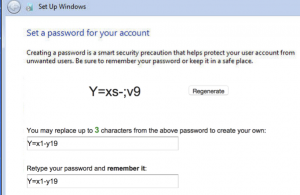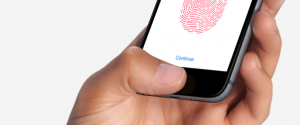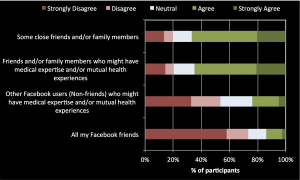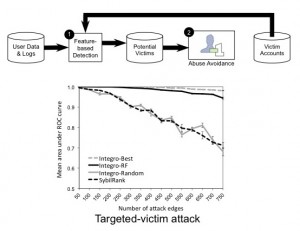 SOUPS ’16 paper on the prevalence of snooping on mobile phones has received Distinguished Paper award. The paper reports a series of quantitative studies that allowed a more accurate measurement of this phenomena. The study was led by our collaborators at the University of Lisbon. It was inspired by our previous study presented at Mobile CHI ’13. Continue reading
SOUPS ’16 paper on the prevalence of snooping on mobile phones has received Distinguished Paper award. The paper reports a series of quantitative studies that allowed a more accurate measurement of this phenomena. The study was led by our collaborators at the University of Lisbon. It was inspired by our previous study presented at Mobile CHI ’13. Continue reading
Collaborative Study of Snooping on Mobile Phones Gets SOUPS Award
Sharing Health Information on Facebook Among Americans
Motivated by the benefits, people have used a variety of web-based services to share health information (HI) online. Among these services, Facebook, which enjoys the largest population of active subscribers, has become a common place for sharing various types of HI. At the same time, Facebook was shown to be vulnerable to various attacks, resulting in unintended information disclosure, privacy invasion, and information misuse. As such, Facebook users face the dilemma of benefiting from HI sharing and risking their privacy. In this SOUPS ’16 paper, we report our investigation of HI sharing practices, preferences, and risk perceptions among US Facebook users. Continue reading
Investigation of Phishing Avoidance
 This paper reports on a design and development of a mobile game prototype as an educational tool helping computer users to protect themselves against phishing attacks. The elements of a game design framework for avoiding phishing attacks were used to address the game design issues. Our mobile game design aimed to enhance the users’ avoidance behaviour through motivation to protect themselves against phishing threats. Continue reading
This paper reports on a design and development of a mobile game prototype as an educational tool helping computer users to protect themselves against phishing attacks. The elements of a game design framework for avoiding phishing attacks were used to address the game design issues. Our mobile game design aimed to enhance the users’ avoidance behaviour through motivation to protect themselves against phishing threats. Continue reading
What I Love About My Research
As part of Innovate (in October) 2015, I gave a 7-minute “edutainment” talk, explaining in a very accessible form my current research, using an example of a recent study of iPhone’s TouchID:
Findings on Touch ID in plain (British) English
My research group had a paper presented at SOUPS on the interplay between TouchID and iPhone security, which I’ve described in a recent post. Here’s a video made by a wonderful team at Kindea Labs that explains the key findings in language accessible virtually to anyone:
Towards strong and memorable passwords
 System-generated random passwords have maximum password security and are highly resistant to guessing attacks. However, few systems use such passwords because they are difficult to remember. In this paper, we propose a system-initiated user-replaceable password scheme called “Surpass” that lets users replace few characters in a random password to make it more memorable. Continue reading
System-generated random passwords have maximum password security and are highly resistant to guessing attacks. However, few systems use such passwords because they are difficult to remember. In this paper, we propose a system-initiated user-replaceable password scheme called “Surpass” that lets users replace few characters in a random password to make it more memorable. Continue reading
Android Rooting: Methods, Detection, and Evasion
 User root their Android (or jailbreak their iPhone) smartphones. They do so in order to run useful apps that require root privileges, to remove restrictions by carriers and hardware manufacturers, and to alter or remove system apps. Rooted devices are prevalent. According to a recent Android security report, Google Verify Apps detected rooting apps installed on approximately 2.5M devices.
User root their Android (or jailbreak their iPhone) smartphones. They do so in order to run useful apps that require root privileges, to remove restrictions by carriers and hardware manufacturers, and to alter or remove system apps. Rooted devices are prevalent. According to a recent Android security report, Google Verify Apps detected rooting apps installed on approximately 2.5M devices.
How Much Can Chunking Help to Remember Banking PINs?
 To ensure that users do not choose weak personal identification numbers (PINs), many banks give out system-generated random PINs. 4-digit is the most commonly used PIN length, but 6-digit system-generated PINs are also becoming popular. The increased security we get from using system-generated PINs, however, comes at the cost of memorability. And while banks are increasingly adopting system-generated PINs, the impact on memorability of such PINs has not been studied.
To ensure that users do not choose weak personal identification numbers (PINs), many banks give out system-generated random PINs. 4-digit is the most commonly used PIN length, but 6-digit system-generated PINs are also becoming popular. The increased security we get from using system-generated PINs, however, comes at the cost of memorability. And while banks are increasingly adopting system-generated PINs, the impact on memorability of such PINs has not been studied.
In a collaboration among Honeywell ACS Labs, Sungkyunkwan University, Oregon State University, University of Illinois at Urbana-Champaign, and UBC, we conducted a large-scale online user study with 9,114 participants to investigate the impact of increased PIN length on the memorability of PINs, and whether number chunking techniques (breaking a single number into multiple smaller numbers) can be applied to improve memorability for larger PIN lengths. Our findings have been reported at SOUPS ’15. Continue reading
Touch ID: How Does It Affect iPhone Security?
 Recently, Apple has introduced Touch ID, which allows a fingerprint-based authentication to be used for iPhone unlocking. It’s positioned to allow users to use stronger passcodes for locking their iOS devices, without substantially sacrificing usability. It is unclear, however, if users take advantage of Touch ID technology and if they, indeed, employ stronger passcodes. In order to answer this question, at LERSSE, we conducted three user studies through which we found that users do not take an advantage of Touch ID and use weak unlocking secrets. Continue reading
Recently, Apple has introduced Touch ID, which allows a fingerprint-based authentication to be used for iPhone unlocking. It’s positioned to allow users to use stronger passcodes for locking their iOS devices, without substantially sacrificing usability. It is unclear, however, if users take advantage of Touch ID technology and if they, indeed, employ stronger passcodes. In order to answer this question, at LERSSE, we conducted three user studies through which we found that users do not take an advantage of Touch ID and use weak unlocking secrets. Continue reading
Improving Detection of OSN Fakes by Predicting Victims
LERSSE student Yazan Boshmaf (co-supervised with Matei Ripeanu) has presented at NDSS last part of his Ph.D. research, Integro. It helps OSNs detect automated fake accounts using a robust user ranking scheme. The key idea is based on an insight that victims, benign users who control real accounts and have befriended fakes, form a distinct classification category that is useful for designing robust detection mechanisms. As attackers have no control over victim accounts and cannot alter their activities, a victim account classifier which relies on user-level activities is relatively hard to circumvent. Moreover, as fakes are directly connected to victims, a fake account detection mechanism that integrates victim prediction into graph-level structures can be more robust against manipulations of the graph. Continue reading


